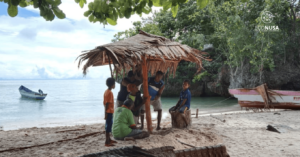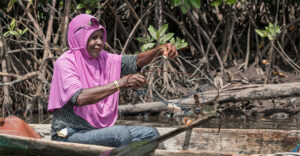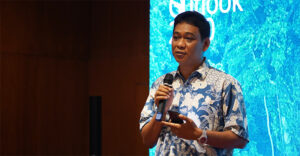
Coffee farming in Papua has been going on for a long time around the 1950s since the Dutch still controlled Irian Jaya. After World War II, the Dutch government and missionaries boosted development, including coffee farming. The results of coffee production also served as a drink to accompany discussions on the dynamics of Papua between Queen Wilhelmina and eight officials from Papua.
Decades later, Tanah Papua has become one of the islands in Indonesia that produces the best coffee. Coffee lovers are certainly familiar with coffee from Wamena City and Dogiyai Regency. Both places have managed to attract the attention of the coffee industry thanks to their distinctive coffee flavors. Apart from Wamena and Dogiyai, other coffee-producing areas in Tanah Papua cannot be ruled out, such as coffee produced from Paniai Regency.
Coffee farmers in Paniai use seeds that come from the Blue Mountains of Jamaica. Renowned around the world, Jamaica Blue Mountains (JBM) coffee produces a mild flavor with a subtle acidity, floral aroma and almost no bitterness in every sip.
Thanks to the similar land contours and weather, the Dutch government brought JBM seeds to Papua New Guinea. From there, missionaries brought and planted JBM seeds in Moanemani, Dogiyai County. Then coffee farming spread to the Jayawijaya, Bintang Mountains, Mimika, Paniai and Deiyai areas.
Paniai Regency is one of the regencies located in the central mountainous region in the Meepago landscape, Papua Province, which is located at an altitude of 1,700-2,000 meters above sea level (masl). Paniai Regency has its capital in Enarotali. To reach Paniai Regency, it can be reached by land and air via Nabire Regency by taking the land route or by air network. Nabire distance to Enarotali is 268 kilometers through Dogiyai and Deiyai Districts which are also distribution routes for goods and services in the central mountainous region.
According to the Community Welfare Development Foundation (Yapkema), the number of coffee farmers in Paniai is 400 farmers. The largest number of coffee farmers are in the Dogiyai area with 1,200 farmers and Deiyai has the fewest farmers, namely 40 farmers.
The coffee farm in Paniai continues to grow. To boost coffee production, Paniai Regent Meki Nawipa launched a program to plant one million coffee trees in March 2019. This program provides a moral boost to farmers. In fact, Meki Nawipa promised a monthly assistance of IDR 3 million for every hectare of coffee plantation owned by residents.
“We need to support this government program as an effort to move the economy of the people in Paniai. In the next 4-5 years, coffee farmers who grow coffee today will reap the rewards, ”said Hanok Herison Pigai, a coffee activist and national head coach of Arabica coffee.
The community has welcomed the passion of coffee farming. Kris Kadepa, a coffee farmer in Toyaimoti Village, Agadide District, Paniai Regency, has actively invited his friends and relatives to plant coffee. He distributed free coffee seeds to anyone who wanted to grow coffee.
“For me, coffee is a lifeline. Through coffee, my family and I can meet the needs for the future of my children and family, ”said Kris.
For coffee farmers in Paniai, coffee is hope. They grow coffee with their hearts and love to serve it in a cup of coffee. Through coffee they care for nature which has become a “mother” for every generation who lives and grows in Papua.
Editor: Leo Wahyudi







